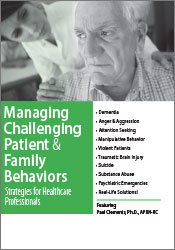

In this interactive seminar, expert and international speaker, Paul Thomas Clements, PhD, APRN-BC, will teach you tips and tools that you can use immediately when faced with challenging patient and family behaviors. This program includes numerous practical strategies that you can implement with difficult situations like aggression, dementia and attention-seeking behaviors while maintaining patient and staff safety. The recording will be filled with opportunities to apply many of these strategies to real patient situations, case studies and interactive discussions. Don’t miss this chance to learn techniques you can implement successfully with your most difficult patients.
| File type | File name | Number of pages | |
|---|---|---|---|
| Manual - Managing Challenging Behaviors (4.9 MB) | 40 Pages | Available after Purchase |
Paul Clements, PhD, APRN-BC, is a psychiatric clinical specialist, an experienced therapist, forensic consultant, and critical incident/trauma response specialist with over 25 years experience in a variety of psychiatric healthcare roles. Throughout his impressive career, Paul has worked directly with patients with major psychiatric diagnoses, in both inpatient and outpatient settings. He looks forward to sharing from his expertise as you strive to successfully meet the challenges caring for these patient populations in your own practice settings. His keen insights have been requested to provide counseling and crisis intervention to surviving family members in the aftermath of murder, suicide, motor vehicle accidents, and sudden infant death syndrome, as well as to survivors of interpersonal violence such as sexual abuse, rape and stalking. Additionally, Paul provides nationwide hospital consultation to establish workplace procedures to ensure patient and staff safety/violence prevention through the development of critical risk assessment approaches. Paul's expertise has been reflected through numerous publications and he remains a sought-after conference presenter on the topics of psychiatric/mental health diagnoses, violence and aggression. He is an Advanced Practice Psychiatric Nurse (APRN-BC) with national board certification and holds a Doctor of Philosophy in Psychiatric Forensic Nursing from The University of Pennsylvania.
Speaker Disclosures:
Financial: Paul Thomas Clements is an Associate Clinical Professor at Drexel University - College of Nursing and Health Professions. He has numerous publications and is regularly interviewed for television, radio, and print media. He receives a speaking honorarium from PESI, Inc. He has no relevant financial relationships with ineligible organizations.
Non-financial: Paul Thomas Clements has no relevant non-financial relationships to disclose.
Difficult Patient Encounters: Asking the Right Questions
What Type of Communicator are You?
Motivational Interviewing
The Family
Psychiatric Emergencies
Substance Misuse
Other Medical Conditions
Acute Psychosocial Crisis
Suicide
Violent Patients
Please wait ...